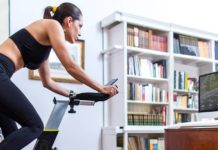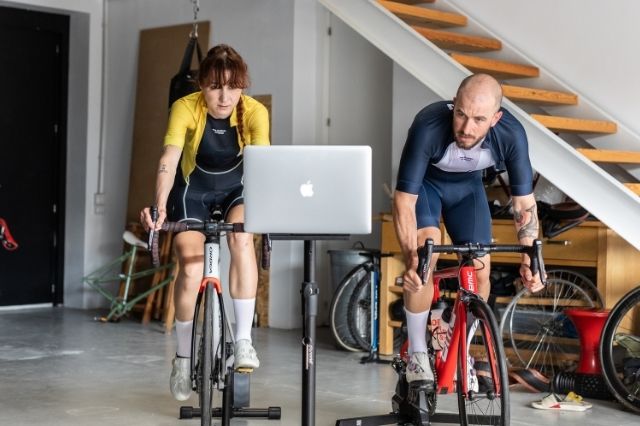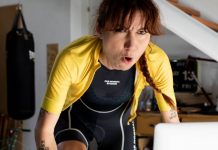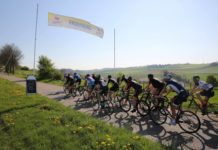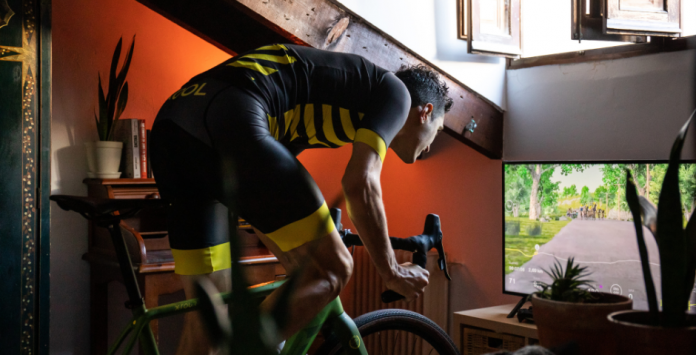Indoor cycling is a good cardiovascular exercise that is certainly within everyone’s reach, from professionals to beginners. By doing this exerise, you train both the lower and upper body muscles, as well as the most important one: the heart.
Exercising these muscles is very easy and even easier with BKOOL, since, in addition to the numerous and varied routes, it has the Fitness mode which offers personalised classes. The different settings that can be configured with the simulator allow the user to establish more or less demanding workouts, according to their preferences.
There are many benefits of practicing indoor cycling, including toning and developing muscle -especially in legs, abdomen and glutes-, and, as a result, obtaining an athletic and healthy figure.
So, besides the legs, abdomen and glutes we have mentioned, what other muscles are involved in this training? Now let’s take a look.
Indoor cycling, which muscles are exercised?
Indoor cycling exercises many muscles: legs, thighs, glutes (lower body) and abdominals and back (upper body).
Lower body muscles
- Triceps suralis: commonly referred to as the calf, this is a set of muscles located at the back of the leg, in the area extending from the knee to the ankle.
This group includes the gastrocnemius muscles (calf and soleus), with the calcaneal tendon or Achilles tendon functioning as the base of the muscle. The triceps suralis works mainly in the final phase of the pedaling impulse, once the quadriceps has acted.
- Quadriceps and hamstrings. These two muscles are located, respectively, on the front and back of the thighs, and are the ones that work constantly during pedaling.
The hamstrings are the muscles responsible for contracting the leg during pedaling, while the quadriceps are responsible for straightening the leg and pushing the pedal to the ground.
- Muscles of the gluteal region. The gluteus maximus, gluteus maximus, gluteus medius and gluteus medius, which are worked more intensely when rising from the saddle than when seated. Nevertheless, in both positions they are exercised correctly.
Upper body muscles
- Biceps and triceps. These muscles are located at the front and back of the arms and are exercised by the support provided by the handlebars.
The way to work them intensely is by gripping the handlebars tightly. This happens when doing sprints or when pedaling upright.
As with the glutes, pedaling while standing up puts more pressure on both the arm muscles (biceps and triceps) and the lower back muscles.
- Back muscles. By this we mean the quadratus lumborum and iliopsoas, which help maintain posture and support the spine.
- Abdominal muscles. Namely, lesser and greater oblique, transverse and rectus abdominis muscle. All of them ensure correct posture and balance of the pelvis and spine on the bike.
The most important muscle: the heart
Exercising this muscle does not have physically visible results, as is the case with the rest of the muscles, however, this aerobic activity with cardiovascular health benefits gets the heart to improve its ability to beat at a lower heart rate.
This has a significant impact on lowering blood pressure and this reducing the risk of cardiovascular disease.
The benefits achieved come from the regulation carried out by the heart during exercise, since our body produces a high demand for oxygen that this muscle satisfies by pumping more blood and beating faster.
As you can see, the muscles that are exercised with indoor cycling are found in both the lower and upper body, not forgetting the heart. There is no doubt that getting on the smart trainer and pedaling will improve your fitness, so what are you waiting for? Come on!
